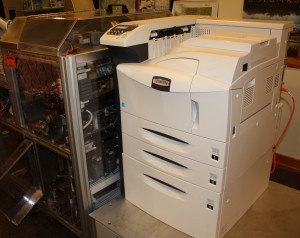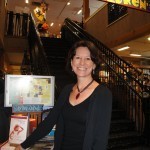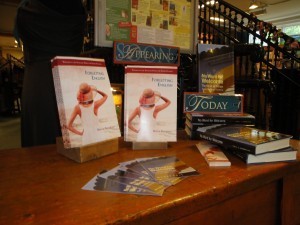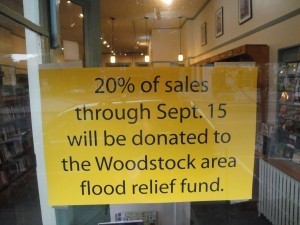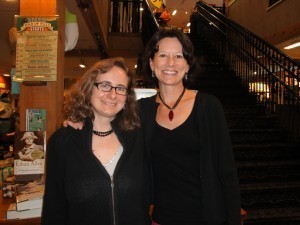Midge Raymond's Blog, page 43
October 24, 2011
Weekly Writing: The dark side
One of the biggest challenges for me when I began writing fiction was getting comfortable with the notion of putting my characters in really awkward situations, of having bad things happen to them, of having them do bad things to others. (Readers of my work know I've overcome this little obstacle, to say the least.)
As a writer, you need to create tension in your stories, which means creating conflict. And this means showing us the not-so-honorable sides of human beings. And this doesn't mean your characters have to be terrible people — it means only that they need to show us their secret dark sides. And they need to surprise us.
Write about your — or your character's — dark side. This can be a secret wish, a family secret, a forbidden relationship — anything that might motivate your character either to act out or to hide.

October 17, 2011
Weekly Writing: Quickies
Because most of us writers are writing around our day jobs, childcare, housework, yard work, volunteering, and everything else, this week I'm offering these Quickies, which means you have no excuse not to write this week!
These writing exercises can be done in five minutes or fewer — perfect for the busy writer. Enjoy!
- Write about burning dinner.
- Describe your neighbor's dog.
- Write about a really bad first date.
- Describe the way your house looked on moving day.
- Write about coffee.

October 10, 2011
Weekly Writing: Physics (sort of)
To every action there is an equal and opposite reaction — for the laws of motion as well as for characters. Without getting into physics here, let's look at this in terms of character, i.e., the idea that from a writerly perspective, this means conflict — and this is where the fun begins.
Take two characters and put them into a situation in which they do not agree (this can be anything from where to have dinner to whether or not to have children). Then write. You can write this as dialogue, from one character's POV, or from both – the only condition is that neither character gives in.

October 5, 2011
Instant books, via the Espresso Book Machine
It was a couple of years ago that I first saw an Espresso Book Machine (EBM) at work, at Village Books in Bellingham, Washington. It was impressive to see an entire book printed and bound in less than ten minutes — and even more impressive than the technology is the print-on-demand aspect itself: Books are made to order, which means no print overruns, which means no waste, which means more trees get to live.
Formerly used mainly for self-publishing, the EBMs are showing signs of going more mainstream. HarperCollins recently announced that it plans to make about 5,000 trade paperback backlist available for printing via EBM — and On Demand Books (the company behind the EBM) has also just announced that it plans to register with Google so that all EBM titles will become available through the Google Books website.
I caught a firsthand glimpse of the mainstreaming of the EBM on my recent book tour, when Northshire Bookstore in Manchester Center, Vermont, printed up copies of Forgetting English rather than ordering the books and having them shipped. A couple of readers got to see their books being printed, which was fun — and the quality was amazing. The book cover was matte rather than glossy, and the pages were thick, the print crisp, and the binding strong. And I got a kick out of seeing a new and different version of Forgetting English, made to order.
The Espresso Book Machine at Northshire is located in a little nook near the front of the store, close to the cash registers. Northshire also has its own imprint, Shires Press, which offers a variety of packages for authors who want to self-publish their books — a very smart idea and likely one of the many reasons this bookstore is celebrating its 35th birthday and going strong.
And Northshire is far from the only indie bookstore to have an EBM: Check out this list of EBM locations, which comprises indie bookstores, university bookstores, and libraries all over the world, including in the U.S., Canada, Japan, Egypt, United Arab Emirates, China, the Philippines, Australia, and England. If there's an EBM located anywhere near you, I recommend checking it out (and printing up a book!); it's a fascinating machine that may very well play a very large role in the way publishing looks in the future.

October 3, 2011
Weekly Writing: Consequences
When writing fiction, the fun part is creating characters who can behave badly (at least, I find this fun). In real life, most of us are all-too-aware of the consequences of what we say and do; we're generally careful and law-abiding. But sometimes, wouldn't it be a lot more interesting not to be?
Write about a character who does something without thinking of the consequences. It needn't be too outrageous, but it should be something this character wouldn't normally do, whether it's playing hooky from work or having an affair. Include the moment he/she makes the decision to go forward as well as the consequences of his/her actions.

September 27, 2011
Bookstore Geek: Tree House Books
Tree House Books in Ashland, Oregon, is one of the town's many treasures. I first visited this sweet little children's bookstore last year, around the holidays, while shopping for the little readers in my life. And I'm glad I did — it's one of the most charming bookstores I've ever seen, and it's fun to wander around inside even if you are a grown-up. There really is something for everyone here.
Tree House Books has been on the Plaza in Ashland since 1978 but has relatively new owners who curate a hand-picked selection of books for infants to young adults, as well as a small selection of their favorite books for grown-ups as well. The space is welcoming and inviting, and in addition to books there's a wonderful selection of gifts, toys, and seasonal items that makes it worthwhile to stop in for a look whenever you're walking by.
Tree House also has a book club for kids age 11 and older (if there's anything better than a book club, it's a book club for young readers) as well as many other events, including local author appearances. And be sure to check out Tree House's October calendar, coming soon, for upcoming Halloweeny events.

September 26, 2011
Weekly Writing: Setting the scene
One of the things that often gets neglected in scenes is a sense of place. This week's prompt is more of a revision, designed to infuse your work with a stronger sense of setting.
Take a scene from your writing project that lacks a sense of the physical. Add details, including where the scene takes place; how it looks, feels, smells, sounds; what the lighting conditions are; and what the weather is. Make sure that the setting you create reflects the mood and tone of the scene itself.

September 22, 2011
Notes from a book tour
Years ago, before my book was published, I remember reading an article by a very successful author who was complaining about doing book tours. And I remember thinking, How can any author fortunate enough to have a book published and a tour scheduled complain about the privilege not only of having a book out in the world but of being able to meet her readers?
Now, after having just completed a ten-day whirlwind tour of my own, I can empathize a little more — it really is quite exhausting — but I most definitely cannot complain.
For one, I feel so fortunate to have teamed up with my friend and fellow writer Wendy Call, whose amazing book No Word for Welcome (University of Nebraska Press) was published two months after my book, Forgetting English, was reissued by Press 53. Though my book is fiction and hers narrative nonfiction, our books touch on similar themes — the global economy, home and travel, border crossings both literal and figurative — and we put together a series of workshops, seminars, and joint readings that made for a very busy ten days.
We did eight events in four states, traveling through Hurricane Irene-damaged areas that sent us on all sorts of detours, which were so very minor compared to what most residents were going through. It was amazing to see how these communities we visited bonded together; the photo below is from Woodstock's Shiretown Books:
Wendy and I gathered a whole series of lessons from this tour, and if I had to sum them up as one, it would be: Be prepared. For anything.
We had water shortages, a car break-in, oddly timed meals (our first meal at 4 p.m. one day, dinner at 11 p.m. on another), and a lot of detour stress. Yet the less-than-fun aspects were offset by being hosted by fantastic indie bookstores and generously taken in by amazing friends. We met with inspiring students and writers, and, no matter how long the day, we always managed to have a glass of wine and at least a few hours' sleep at the end of it.
I've learned that book events are one thing, whereas an extended book tour is another thing entirely. Book touring is for writers who are flexible above all else – you never know what you'll encounter when you show up for an event. You need to be prepared for detours, of course, and for events that need to start late or end early. Be prepared for crowds larger than you'd expected, or smaller than you'd hoped. Be prepared for more questions than you have time for, or for no questions at all.
But most of all, be prepared to have a lot of fun. I reminded myself, even in the challenging moments, that we were out there talking about our books, which is something many writers don't have the opportunity to do.
So if you're a writer considering a tour, remember that, despite the inevitable challenges, when you do a book tour you're not only meeting your readers but supporting indie booksellers, community centers, and other venues important to the literary world. And if you're a reader, go to your nearest bookstore on an event day and see what it's all about.

September 19, 2011
Weekly Writing: Detours
Detours are on my mind today, after an exhilarating ten days on the road with my friend and fellow author Wendy Call as part of our joint book tour stretching from the Pacific Northwest to the Northeast to the Midwest. Several of our events took us through hurricane-damaged Vermont, where we encountered closed roads, detours, and ravaged homes and businesses. For us, the detours were minor inconveniences; for those living in these flooded towns, the detours are life-changing.
So with good thoughts and wishes for those still recovering in Vermont, here is this week's writing exercise:
Write about a detour, large or small.

September 11, 2011
Weekly Writing: Places, everyone
Often what gets neglected in a scene — at least, in my first drafts it does — is a sense of where the characters are physically. Yet this is so important: These details tell us so much about the characters' personalities, their relationships to others in the scene, how they feel about what is happening.
Take a scene you're working on, and think like a stage director. Note where each character is, whether he or she is standing, sitting, pacing. Get these characters in their places — wherever they need to be to reveal what's happening in the scene, how they feel about it, and where they're headed from here.



